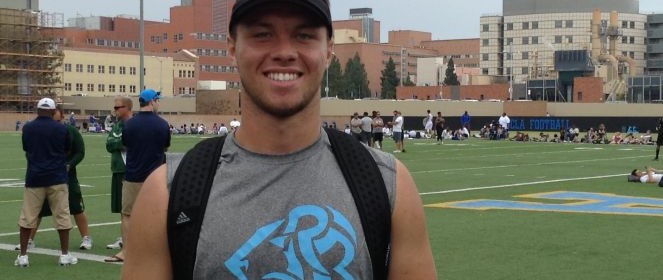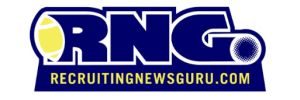Interview: Former 4-Star UCLA TE Jimmy Jaggers Talks Going into Transfer Portal

Written by Ryan Wright
Twitter: @RyanWrightRNG
After a four-star high school football career with Roseville, Class of 2017 tight end Jimmy Jaggers was atop recruiting boards across the country as one of the best in the nation. With seemingly his pick of top schools to choose from including offers from Alabama, Michigan, Florida, Vanderbilt, Washington State, Tennessee, Utah, Texas A&M, and USC, the 6-4, 240-pound, pro-style end signed with UCLA. A redshirt season in 2017 under then head coach Jim Mora (2012-17) gave way to former Oregon Ducks, Philadelphia Eagles (2013-15) and San Francisco 49ers (2016) head coach Chip Kelly. Along the way, two football related concussions and a third via a car accident put Jaggers career on hold. An offer of a medical retirement by the UCLA staff was given to Jaggers, which he took without undue pressure. As is the case with all athletes, once the seed to compete has been planted it is hard to walk away from the game.
On Wednesday, Feb. 27, Jaggers entered the transfer portal seeking a return to the game he loves by opening his recruitment once again. The immediate concern for most with Jaggers is not his talent or desire to play the game, but his health status. The good news, Jaggers went through extensive cognitive testing by UCLA’s medical staff immediately following the concussions and with subsequent follow up visits with their physicians receiving a full clearance. The same good news came from former San Francisco 49ers and current San Jose Sharks team physician Dr. Albert Ting receiving a full clearance as a second opinion for Jaggers and his family. Now there is even better news for college football programs, if Jaggers receives a medical redshirt for the 2018 season, and clears NCAA waivers, he could be an immediate impact player with four years to play four.
In an RNG exclusive interview, I sat down with Jaggers learning more about his medical testing and his motivation to get back on the field.
Interview
Jimmy, how did the medical retirement come about with UCLA?
“When I met with the staff after my car accident, they offered me the medical retirement option. They were clear with me stating, “We can’t technically stop you from playing football. After all your tests, all the tests have returned positive with normal brain functions. You have no threat of brain problems right now, but you are at the three-concussion benchmark which is why the UCLA staff feels comfortable offering you a medical retirement if you want it. We cannot keep you off the field, but you are at lowest spot with concussions to offer a medical retirement.”
At that time, what went into your decision?
“When they offered me the retirement, it was about two to three weeks after my third concussion. I was not 100 percent certain about my own health status and future as a young adult. In those cases, you have to make the decision you feel is right for yourself. I was thinking I can just focus on school and get a UCLA degree. As a 19-year-old, I thought I was doing the right thing. But after a summer and fall without football, it was difficult for me. During the season, I tried to ignore social media and news about UCLA football. It was difficult because I wanted to be out there with them. I have a new perspective on everything now. I am even more appreciative of the opportunities of playing football now.”
One of the big questions I have for you, what do the medical tests show about your cognitive functioning skills after the concussions? You mentioned that UCLA said you could still continue to play if you wanted.
“Good question. I have been cleared by Dr. Albert Ting, a former 49ers team doctor and current San Jose Sharks team doctor. I went through about seven hours of testing with UCLA’s neuropsychology department, everything came back that my brain was fine. Actually, better in some scores than they predicted. I did not have prolonged symptoms with each concussion in the fact they did not extend beyond five days to 10 or 20 days but simply stayed around a week each time. I also never lost consciousness or had loss of memory in the injuries.”
You mentioned how hard it was for you knowing summer workouts with UCLA were going on and once the season began how much more difficult it became for you to be away from the game. What ultimately got you to put your name into the transfer portal?
“I didn’t want to have any regrets. I don’t want to say ‘man I wish I kept playing.’ You can’t go back and change the past, and I can’t let an opportunity go by without trying. When I started asking myself questions about what I wanted to do for the next couple of years of my life, what am I passionate about? Its football. I was coaching pre-school kids in all sports the summer after I retired. I had a great time with that. I was gearing towards real life looking at a real-estate license or possibly going to law school. I knew I was not ready for that or passionate about that yet. Football is what gets me up in the morning. It is my passion. It burns in my heart. It hurts me when I am not playing. With my new perspective, I have a different view on school, working out, eating as an athlete – I have a new perspective on everything. I know when I go back on the field, it will be a different and better me.”
When you came out of high school, you were more the Mark Bavaro (Giants) type of end with your hand down acting as an extra tackle with the ability to make things happen in the passing game. What were the UCLA practices like for you going up against some of the best in the Pac-12?
“The practices were awesome. I really enjoyed Coach Kelly and his staff’s coaching style. They did a very good job of explaining everything. When you know why you are doing something it makes it easier to execute and understand the offense. The practices were fast-paced. You are always working on something. They were always working on us with the thought of bettering us.
“As a tight end in their system, I was in the slot and in the wing. I was not just a traditional normal hand-in-the-dirt tight end. If you look at my high school film and film under Coach Mora, I was often a wingman or tight end on the line. With Coach Kelly, I was in motion more and saw more slot action. I really liked the signs. I liked getting the plays from the sidelines. That allowed us to play faster. Learning the signs was fun for me.”
Is there a particular style of offense you would like to play in during the 2019 season and going forward?
“I came out of high school wanting to play in a pro-style. At UCLA, Coach Rip had just been hired. Coach Mora made it clear to me they were bringing in a pro-style coach to run the offense. That is when they hired Coach Fish. That is where I would like to end up. A Y-type tight end.”
When you transfer, what do you feel you can offer an offense with your skills?
“I think if you had asked me before being involved in Coach Kelly’s offense, I would say I am a physical tight end with toughness, and can block like a lineman, with the ability to catch the ball; those were my skills. With Coach Kelly’s offense, I learned to do a lot more. I have better burst from a two-point stance and run routes better from a two-point stance. I am lot more comfortable being an all-around tight end now.”
How have you been staying in football shape this offseason?
“Through lifting and doing my normal workouts. After I retired, I lost a lot of weight not eating as much; not eating like a college football player. I went into a more functional strength workout routine for the health benefits instead of working out to push human beings around. Now that I am fully committed back to football, I have been working out with Pro Active in Thousand Oaks. I am working to become a better athlete and a better football player.”
What degree are you earning?
“I came to UCLA for a Communications degree. I have switched recently taking Sociology classes. I have not technically declared a major yet. My degree plans may change depending on the school I go to and what they offer.”
When you make a decision on where you will transfer, what are you looking for as the complete package?
“There are a lot of things that go into it. It is a hefty decision. I want to go to a place that has a staff that I want to play for, a staff I enjoy being around and can develop me to my fullest potential. The players and team I will be joining is also important. I enjoyed being around my teammates at UCLA, and I continue to have relationships with those guys even after a year of not playing. We are always stopping and talking to each other on campus. I enjoy having good people in the locker room and on my team. As far as the offense, I am looking at a pro-style offense. Overall, I am looking for quality people on the team and staff, and a place that uses their tight ends and can develop their tight ends.”
Jimmy, it was great catching up with you today. Good luck with your transfer process.
“Thank you.”
Photo credit: recruitingnewsguru.com; Jimmy Jaggers at UCLA

Pingback: Mique Juarez leaves UCLA program, still plans return to football despite concussions – Pasadena Star News – Capital Brilliant